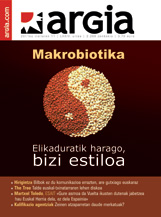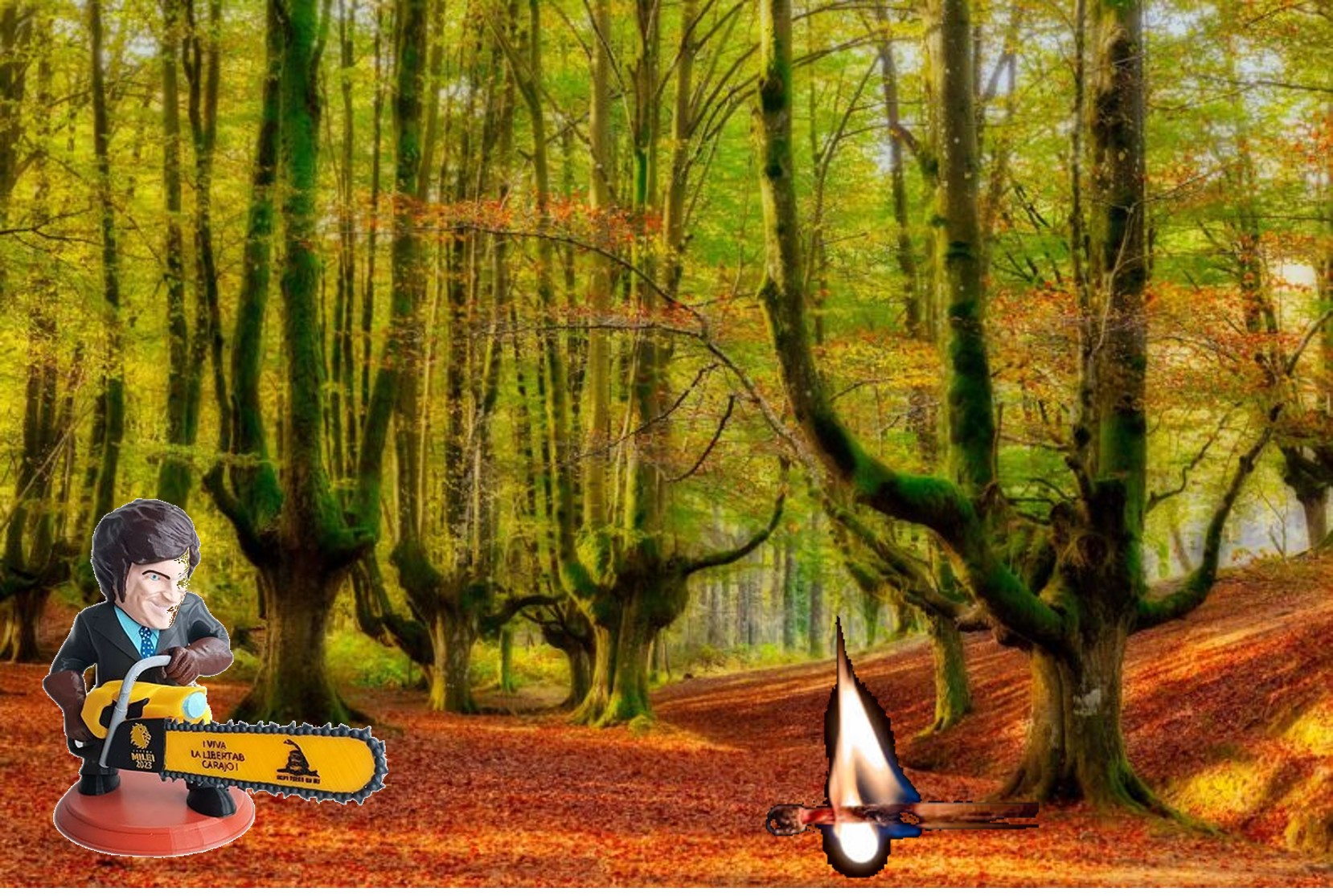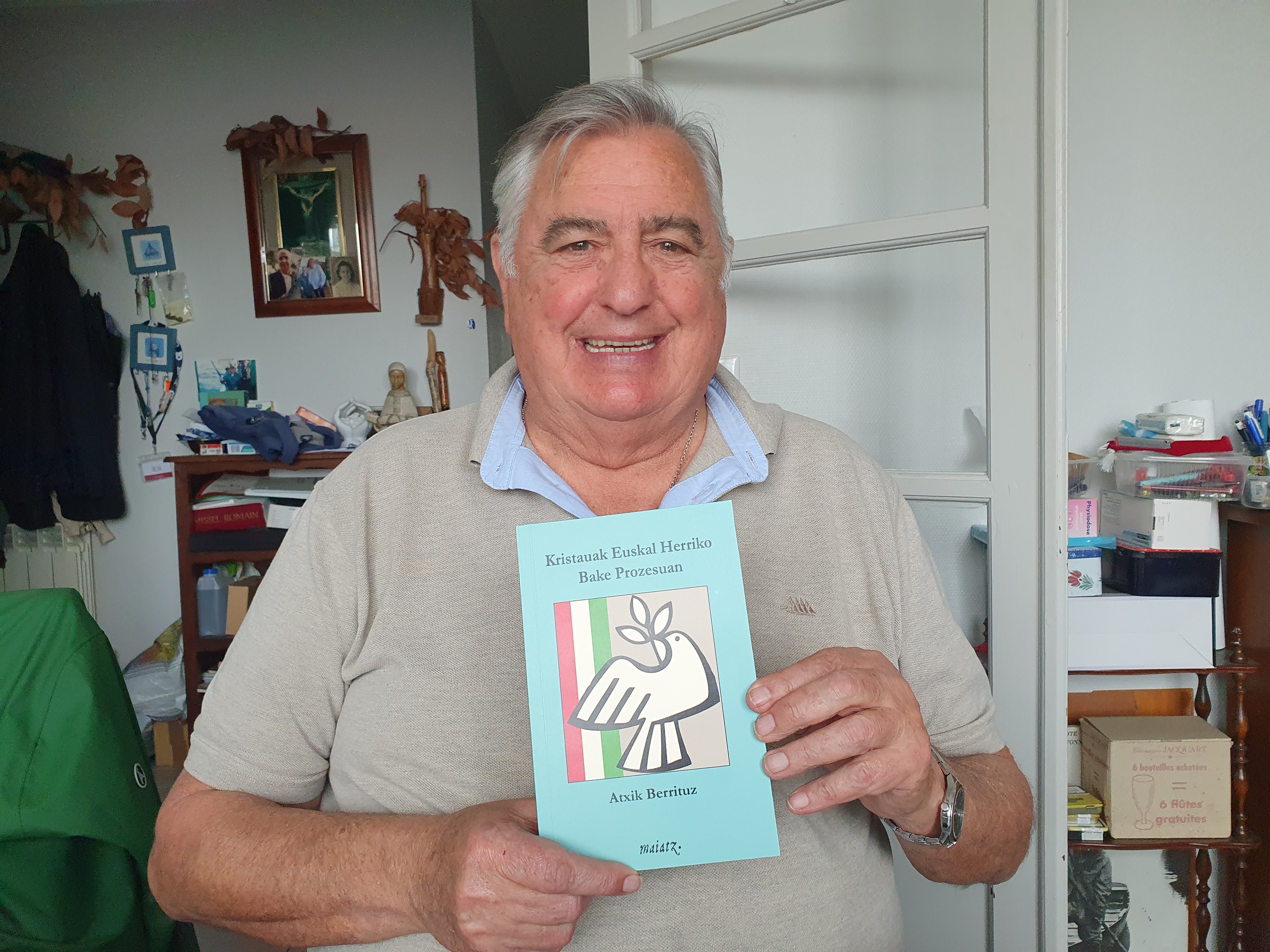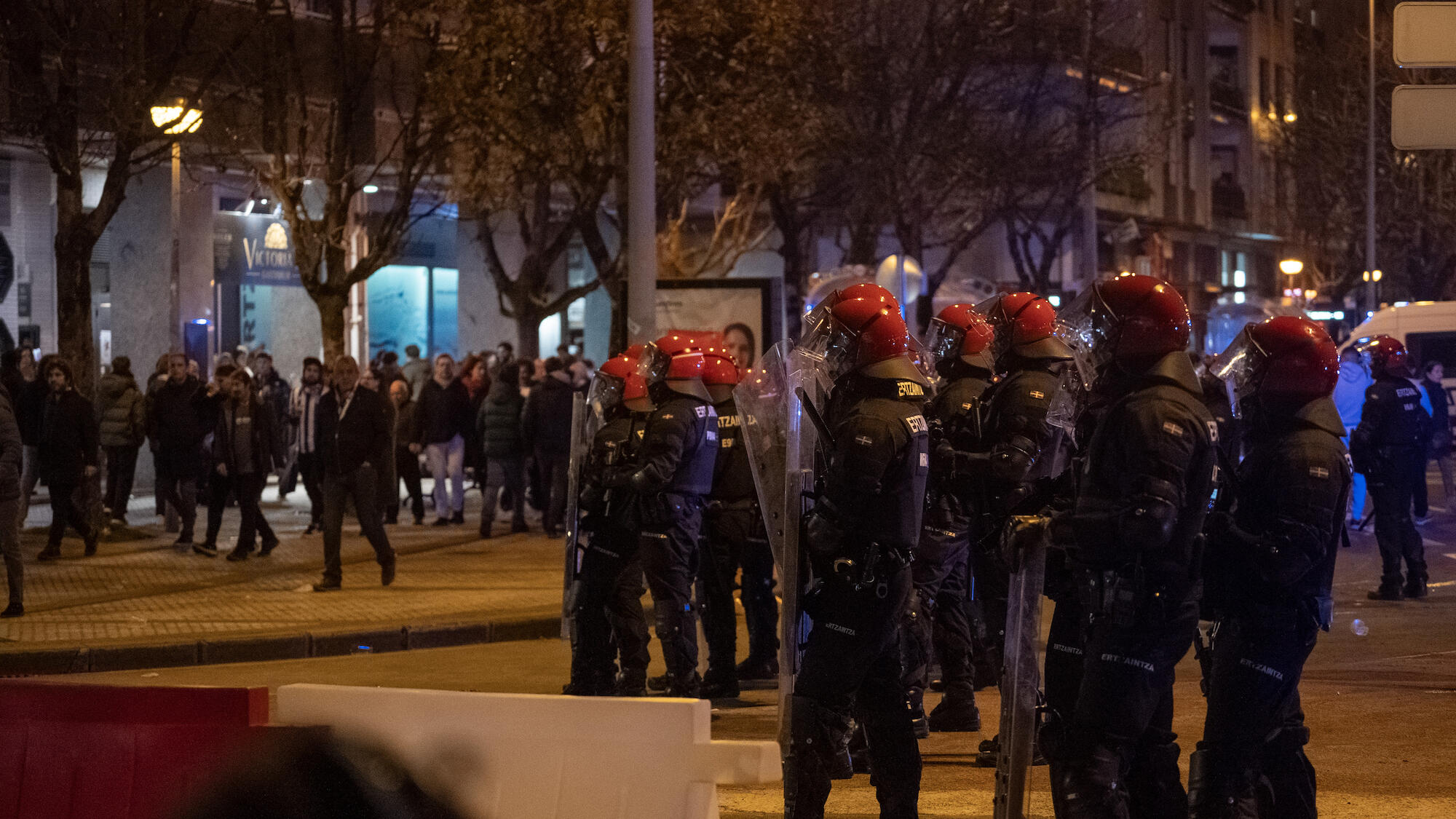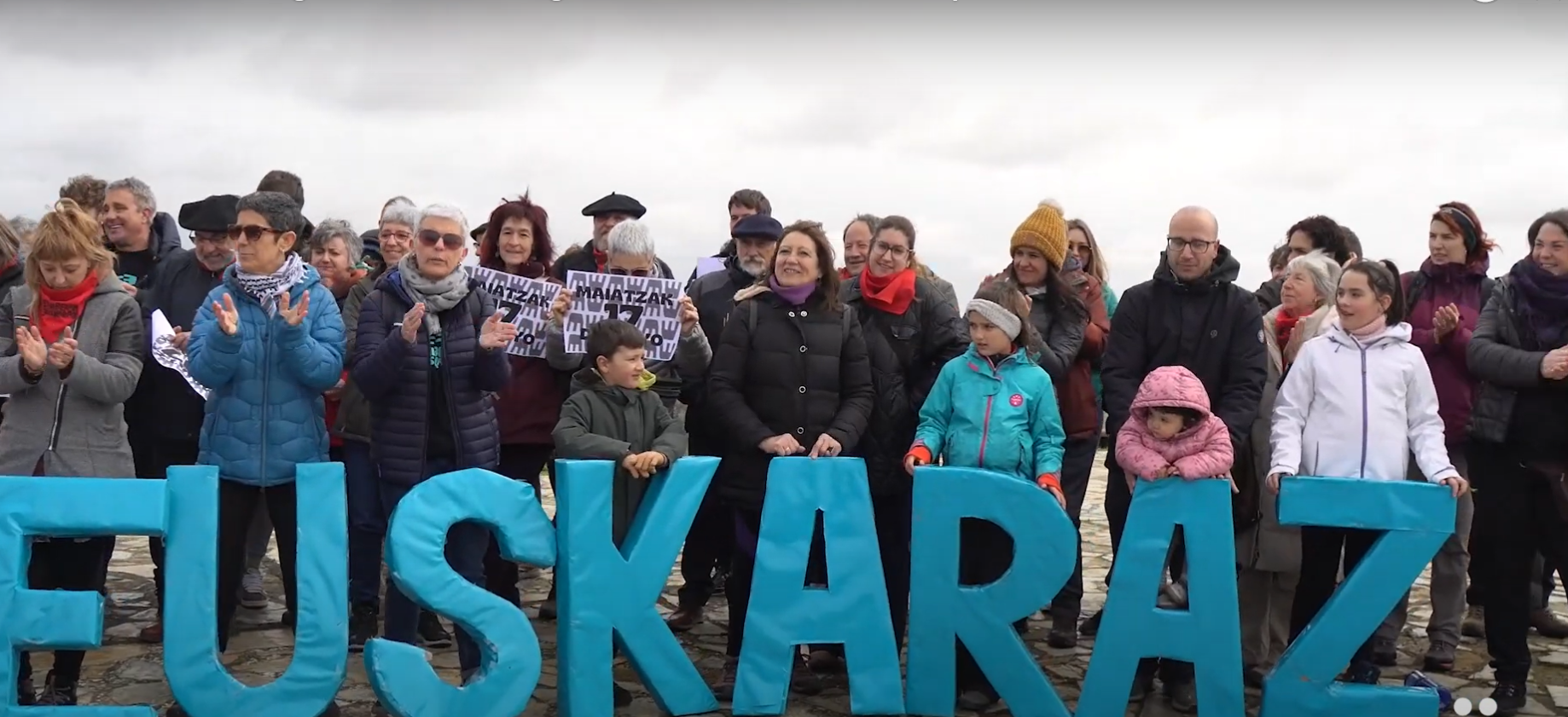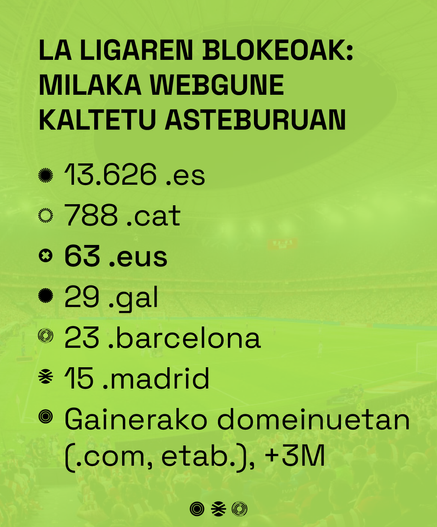"The Basque is what makes the Basque special"
- Here's a journalist, here's a writer, here's an Irish visitor -- who has walked around Euskal Herria and written the book in English. The Basque Country The death of Franco, who has come to our country in a year and since then has not interrupted the connection.
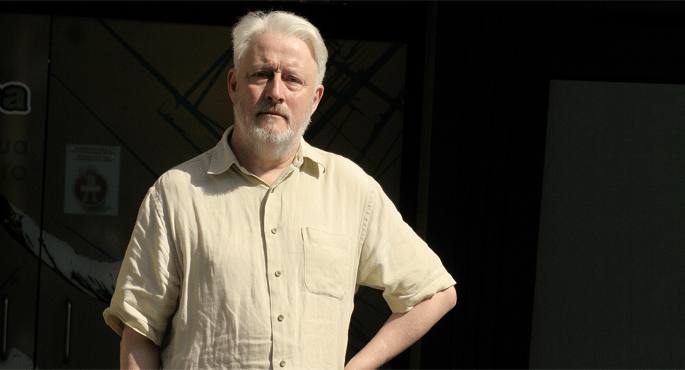
What were you doing in the meantime?
It's the thing I love the least, the thing that upsets me the most. Noise. The noise in the bar, the noise in the TV, the noise in the wallets… That is, for example, one of the areas from Iparralde to Hegoalde: here, let us put people in the bar, and the bustle, and the sound of quinqués and cancas, dishes and crystals, in Iparralde is not like that. And in our case, in Ireland, getting into a pub and asking for something is very poorly educated. In Ireland, the servant would have given me a slap. How annoying! Here, on the other hand, the noise is even the headache! It seems to me that Buddhism has a part of reason, that silence is important, that it is not possible to be in five different places at the same time. Some Basque musicians have also told me: Unfortunately, in Ireland we have so many vices, but there we have kept alive the culture of listening to live music: at home, in Ireland, I have a bar with a long bar, shaped like L. On the one hand, a space for live music, wherever you want to play, you can play alternately. The drinker that is installed there knows that it must be quiet. He knows that, although there is no law. At the other end of the bar, a dialogue area where you can hear music in volume from loudspeakers. I like that more, because I think the bar is for chatting, for reading, or for thinking about this and that when drinking beer.
Read in the bar? Have you seen someone read in Euskal Herria?
What an absurd question! Not very much. I should ask myself whether I saw a lot of people reading in Ireland. It was said that in the former Soviet Union people read a lot when they were on the subway. Yes, also in London, but they had a special reputation in the Soviet Union. As I wrote in my book, an idea I took from Joseba Zulaika, “we want them to see us as the Indians of Europe and, at the same time, as the most postmodern culture on the continent.” It is the hallmark of this culture, wealth! In July I stood next to the Americans, who were astonished at the high level of wealth they have seen in the peoples here. And excessive consumption. I try to read Basque literature – I have read mainly Bernardo Atxaga – and talking to my friends here, who do not have a habit of reading. Or, let's say, who here reads Pius Baroja, who reads Unamuno? I am also interested in this: a pause between the Basque literature and the Basque literature in Spanish. I have been in Gernika, in an exhibition dedicated to Basque writers, where there was neither Barojari nor Unamuno. It seems to me as if they let a fortune be wasted, yours. Amazing. It may be a symptom of Gaelic weakness, but we have no problem putting our writers who have written in English, be it W.B. Yachts, be it Seamus Heaney… In Nigeria, in India, there is talk of the colony’s revenge, that is, that the English speak better than they do. Ha, ha, ha. On the contrary, the English we speak in our country is influenced, at least in part, by the Gaelic syntax. But that Baroja does not go to the exhibition of Basque writers… It has to enter! The Basque language is not the only language of the Basque Country, they have French and Spanish, and with rock and roll and movies, as well as English. Cultural richness, really! The greatest risk of all nationalisms is, in my view, that they are aimed at exclusion. Finally, the origin of any community is based on that spirit: us and others. In any case, exclusion. It can be innocuous, or, on the contrary, aggressive...
You mentioned cultural wealth. Are we Basques richer than anyone? We don't have a partner?
I don't know if he's alone in the world, but I think that combination of tradition and modernity that Basques have is very special. The Irish, for example, when we do traditional dances, we are doing one thing entirely folkloric, it has no other dimension, a really artificial job, done for tourists and for no one else. Here, go to Lesaka, Lekeitio, Laguardia… they party for themselves! If the party comes on a working day, much better for me, in the village there is no more than the people. It's also terrible to see people discussing Alarde. Go for dinner in a society and discuss passionately. On the contrary, he will not, according to his reasons, know who the political party is. And proof of how people experience the party here, which one woman told me: “Paddy, the day I went out to the canteen, was bigger than the day I got married!” Concerning Alarde, it hurts me what is happening, because if I have a hostel somewhere I have had it in Hondarribia, where I lived a year in that 1970s… But that passion, that is, it gives me envy. Or missal! In Lesaka, within a family, the son was an atheist. A day when I spoke to my family and when I left, I had to leave to sing in the choir! “The choir, the church? Are you not an atheist?” “Yes, but it’s the people’s party, and that’s above all beliefs.”
What influence do the people in the Basque Country have on their opinions?
An interesting question… My book, The Basque Country, and in the presentation I tried to express it clearly, is not a history of Euskal Herria. I didn't like that, and I didn't ask anything, because it's the editorial that subtitles it. Cultural History. They wrote to me and told me frankly: “You follow your obsessions!” The book, in short, is an Basque Country by Paddy Woodworth, it can be worth a lot, a little, or nothing, but it's a personal view of me. For example, I really like San Sebastian, but in the book he has only three paragraphs. Instead, Asteasu has a whole chapter! Ha, ha, ha.
Ha, ha, ha.
It's an idiosyncratic book, mine, personal, partial, by Paddy Woodworth. And if I had to do it again now, I would do it differently. I wanted to give the English reader some starting points on the Basque Country, some times deeper, others more worrying. I would like them to depart from here and move to other places. I actually came here for the first time the year of Franco's death, not knowing anything about here, except that it was a different country. Well, there was txapela, ETA too… but nothing good. However, I was curious to know whether there were parallels between the two ETA that were then here and the two IRA in Ireland. Of course, I went to look for work as an English teacher. I knew no one, but I soon made friends, as usual among the Irish, and I met people of all political tendencies.
You sowed the seed of the book Dirty War…
That is not wrong. In order to make a book about dirty war, it was necessary to know those from there and those from here. I also told those of CESID that I had to talk to the people of ETA. To ETA's, the same thing would be said of CESID's. He was a journalist, and the conversation is a way to seduce it. It's a personal relationship. Don't get to the table, not with José Amedo, not with Josu Urrutikoetxea, to condemn him, but to listen to him. When I arrived, I was from the left, I was a militant of a leftist party in Ireland, and here too it was easier for me to contact the left “branch”, with the acronyms then, with those of the PSOE, PC, PT or ORT… I was first in a Deusto apartment, because I was from a friend of Ireland until then.
I thought you were alone.
We got three, I got the first, two good friends later. However, we reached an agreement: we would not live here close to us, not even among foreigners. We would live here among its inhabitants. We live in three apartments. That friend had returned to Ireland in April. Two PT, two PCs, one anarchist, one hippy, two PSOE. One of them from the PSOE was Julián Sancristóbal. We had a very close relationship at that time, but as we went up, we ended up with our relationship. He wasn't interested in having a relationship with me. The last time I saw her was for a funeral at a Germán Mass that the Autonomous Commandos killed in Zumaia or Zumarraga [Germán González López, killed in Urretxu in 1979]. It was then that the PSOE sang on Eusko Gudariak Street, with a raised fist. They say.
If there had been no ETA, would the outsiders have looked here, at this country?
Good question. I think so. Go to the 19th century, here come anthropologists, linguists… Rodney Gallop, who wrote A Book of the Basques, a beautiful book… Yes, without ETA that curiosity would also be. I believe that Euskera is what makes the Basque special. Next to the Basque, there are dance, song and the rest of the components. But the first thing is Euskera. Of course, that is also the industry. The English, for example, realized the iron in the 16th century, the entramados of Shakespeare. The same, the postmodern industry… I have a friend, a nationalist… Basque nationalist – because there are many forms of nationalist, Jaime Mayor Oreja is also nationalist, Basque, but Spanish nationalist and ready! – for that friend – and I do not think he will hurt him, that is, my friend Txema Montero – told me that he was doing the book: “Paddy, I know that you are quite skeptical of Basque nationalism, and that, at the same time, you look in a rather romantic way at the Basque Country, but bear in mind that Bilbao is not, alone and without more, the cradle of Sabino Arana. Bilbao is also the cradle of the PSOE and the PCE. My father was very hardworking, very good and honest, a little naif in politics, very good Christian – in the direct sense of the word – and I remember that morning when the news broke out that they killed Carrero Blanco. My father was going to take me to town that day. "You're celebrating a death, Paddy!" “Yes, I was a great son of a bitch!” He replied: “You should never rejoice that someone has died.” Maybe he had a pacifist father, a very daring attitude. I do not have the courage to share that position. I'm not so brave. I believe that it has been very difficult for both those from outside and those from here to understand the path of ETA since the establishment of democracy, even if democracy has been imperfect. How can we justify the attacks? How can we justify the increase in armed actions? It’s not easy…
Paddy Woodworth (Bray, Irlanda, 1961), kazetaria, Irish Times egunkarian lan egin zuen 1988tik 2002ra. Bi liburu ditu Euskal Herriaren inguruan argitaratuak: Dirty War, Clean Hands: ETA, the GAL and Spanish Democracy, 2001ean, eta The Basque Country, A Cultural History, 2007an, biak ere kritika ezin hobeak jaso dituztenak. Orain berriz, ingurumenari buruzko gaiak aztertzen ari da Chicagoko Unibertsitatearentzat. Era berean, han eta hemen, Erresuma Batuko nahiz Espainiako irrati-prentsetan idatzi ohi du. Ibilaldiak antolatu ohi ditu urtero Euskal Herrian barrena, amerikar nahiz ingeles turista talde txikientzat (www.sansebastianfood.com), bertako gastronomiak eta kulturak Ipar eta Hegoan dituen bereizgarrien arrastoan.
“Tourra zuzentzen dut Euskal Herrian barrena, gidari lanak egiten ditut, eta, zinez, egiten dudan lanik esker onekoena zait. Euskal Herria ezagutu nahi duen jendeari erakusten diot herrialdea –interesa duenari, beraz, ordaindu ere horrelaxe egiten baitu–, eta maite ditudan zoko eta bazterrak erakusten dizkiet. Ez da pribilegio makala, horratik! Jakina, hainbat adiskidek laguntzen didate lantegi honetan, Lesakako Rafael Eneterreagak, kasu. Harriz harri erakusten digu Lesaka, bertako etxeen historia eta berezitasunak oro. Plazer itzela da, atsegin hutsa. Erronka ere bai, idazteak ez dituen zailtasunak baititu, baina era berean, nik nezakeen atseginik handiena”.
“Estreinako urtean, Gasteizko kalean, neska batekin topo egin nuen, ezagutzen nuena. Gabonak ziren, eta afaltzera eraman ninduen beraienera. ETA politiko-militarrekoen inguruan zebilela uste dut. Ni Sinn Fein ofizialeko burkidea nintzen, ETA-pm bat, esaterako, baina hemengo ‘mili’-ekin harremanetan zegoena. Bitxia da orduko harreman gurutzaketa: ETA-pm-koak IRA probisionalarekin zeuden harremanetan, hango ‘miliak’ nolabait. Gu, Sinn Fein ofizialekoak –hango pm-ak, ‘nolabait’, berriz ere–, hemengo ‘mili’-ekin… Aurrerago, neska hark esan zidan, pm-ek esan ziotela ni neure herriaren traidorea nintzela”.
“Txomin Artolarekin aspaldikoa dut harremana. Berriagoa, Joseba Zulaikarekin eta Bernardo Atxagarekin, adibidez. Hauekin, egia esan, bigarren liburu hau idazten hasi nintzen arte ez nuen batere ezaupiderik. Zulaikaren Identidad Vasca, Metáfora y Sacramentok eragin handia izan zuen nigan. Gatazkari buruz, eta euskal kulturaz, inork idatzi dituen pertzepzio zorrotz, sotil, aberatsenak ageri dira liburu horretan. Atxagaren Obabakoak irakurri nuen, eta liburu zoragarria iruditu zitzaidan, izan Euskal Herriko liburua edo nonahikoa. Nire lana idazten ari zela publikatu zuen Soinujolearen semea, Euskal Herria entenditzeko liburu funtsezkoa, nire ustez”.
“Niri zeharo ezinbesteko zait giza harremana, dela elkarrizketa bat Mayor Orejarekin, edo Rufi Etxeberriarekin. Herri bat entenditu nahi bada, maitemindu beharra dago, baina honetaz eta hartaz maitemindu, guztiaz, hein batean, bederen!”.
You may not know who Donald Berwick is, or why I mention him in the title of the article. The same is true, it is evident, for most of those who are participating in the current Health Pact. They don’t know what Berwick’s Triple Objective is, much less the Quadruple... [+]
The article La motosierra puede ser tentadora, written in recent days by the lawyer Larraitz Ugarte, has played an important role in a wide sector. It puts on the table some common situations within the public administration, including inefficiency, lack of responsibility and... [+]
Is it important to use a language correctly? To what extent is it so necessary to master grammar or to have a broad vocabulary? I’ve always heard the importance of language, but after thinking about it, I came to a conclusion. Thinking often involves this; reaching some... [+]
The other day I went to a place I hadn’t visited in a long time and I liked it so much. While I was there, I felt at ease and thought: this is my favorite place. Amulet, amulet, amulet; the word turns and turns on the way home. Curiosity led me to look for it in Elhuyar and it... [+]
Adolescents and young people, throughout their academic career, will receive guidance on everything and the profession for studies that will help them more than once. They should be offered guidance, as they are often full of doubts whenever they need to make important... [+]
Atxik Berrituz giristino taldeak Kristauak Euskal Herriko bake prozesuan liburua argitaratu du Maiatz argitaletxearekin. Giristinoek euskal bake prozesuan zer nolako engaiamendua ukan duten irakur daiteke, lekukotasunen bidez.
Maiatzaren 17an Erriberako lehenengo Euskararen Eguna eginen da Arguedasen, sortu berri den eta eskualdeko hamaika elkarte eta eragile biltzen dituen Erriberan Euskaraz sareak antolatuta









